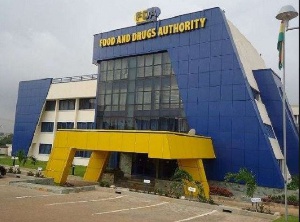 The FDA in recent times has prohibited the advertisement of alcoholic beverages
The FDA in recent times has prohibited the advertisement of alcoholic beverages
The Food and Drugs Authority (FDA) says media outlets and persons that would be found culpable of flouting its directive on prohibition of advertisement of alcoholic beverages would spend between 15 and 35 years imprisonment.
Media outlets and persons are being prohibited from advertising alcoholic beverages between 0600 and 2000 hours.
The FDA said offenders would pay a minimum fine of 7,500 penalty units’ equivalent to GHc90,000, while the maximum fine would attract 15,000 penalty units, equivalent to GHc180,000.
Mr James Lartey, the Head of Communications and Public Education, FDA, told the Ghana News Agency on Thursday that apart from those punitive actions, there was also be administrative fine with a minimum of GHc25, 000 and maximum of GHc75, 000.
He said the Authority was monitoring and noting down the media outlets that were flouting the directive.
Mr Lartey disclosed that the Authority had the Communication and Food Enforcement departments that were undertaking the recordings, which would help the Police in their investigations and prosecution.
“As we are monitoring, we will forward the recordings to the Police for further action and those who would be found liable would be determined after the Police investigations,” the statement said.
Mr Lartey said the FDA held extensive discussions with key stakeholders on October 31, 2017, on the intended ban of advertisement of alcoholic beverages on radio and television stations before issuing the directive.
He said all the stakeholders signed a communique to pledge their unflinching support to the directive and, therefore, expressed surprise that the Ghana Independence Broadcasters Association (GIBA) had called for a revision of the ban.
He mentioned the stakeholders that supported the directive as the Ghana Independence Broadcasters Association, Ghana Health Service, Ghana Police Service and Governing Board of the FDA.
Others are the Ghana Medical Association, Pharmaceutical Society of Ghana, Pharmacy Council, Medical and Dental Council and National Communications Authority.
The rest are the Health Facility Regulatory Agency, Consumer Protection Agency, Advertisers Association of Ghana, Ghana Journalists Association, Ghana Herbal Traditional Practitioners Association, the Bureau of National Investigations, and Traditional and Alternative Directorate of Traditional Medicine Council.
Mr Lartey said the World Health Organisation had directed that only persons who had attained 21 years should patronise alcohol.
However, he said, per the FDA’s regulation, persons who were 18 years and above in Ghana could patronise the product with caution.
Mr Lartey mentioned countries such as Norway, Sri Lanka, Kenya and France that had completely outlawed advertisement of alcoholic beverages on media outlets.
The FDA issued a new directive starting from January 1, 2018, banning the advertisement of alcoholic beverages between 0600 and 2000 hours.
The FDA, in a press release directed media organisations, advertisers, importers and manufacturers of alcoholic beverages to advertise the product after 2000 hours.
The directive is in accordance with the FDA’s Guidelines for the Advertisement of Foods (Section 3.2.6).
It said all advertisement contents on alcohol would be vetted by the Authority before being aired.
The move was intended to safeguard public health and safety, the FDA said.